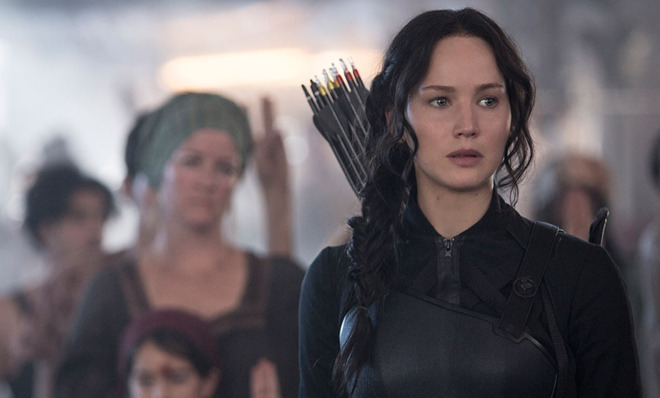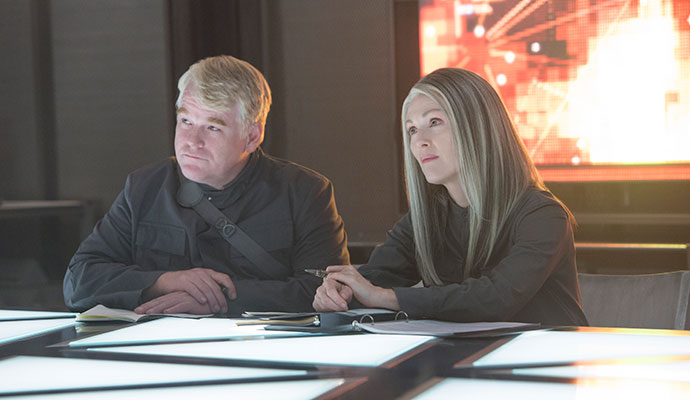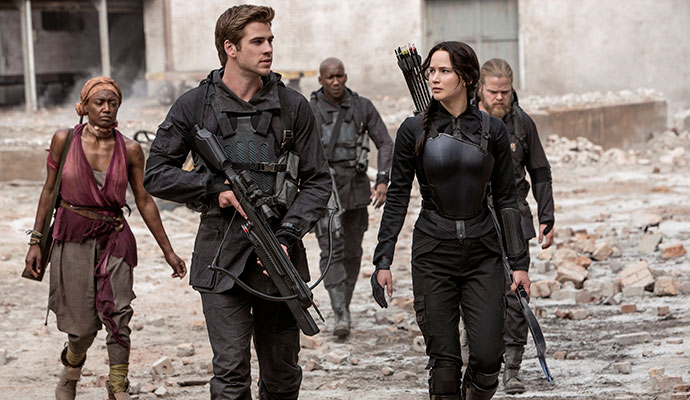Girls on Film: The Hunger Games: Mockingjay isn't an action movie. It's a war movie.
In its third installment, The Hunger Games moves beyond the glitz of the first two movies to offer a hard-hitting look at the impact of war


A free daily email with the biggest news stories of the day – and the best features from TheWeek.com
You are now subscribed
Your newsletter sign-up was successful
After two widely-acclaimed installments, the tenor has changed in the first reviews for The Hunger Games: Mockingjay Part 1. The long-beginning of Katniss Everdeen's final fight, like Harry Potter and Twilight, has been broken into two parts — and not everyone is happy with the decision.
The complaints over Mockingjay Part 1 extend beyond the perceived cynicism of stretching a wildly popular franchise as far as possible. It's a disappointment of tone, as the Hunger Games franchise moves away from many of the things that made it so popular in the first place. The Games are finally over, war is on the horizon, and Katniss, with increasingly debilitating PTSD, is caught in a drab world without any of the pomp and circumstance of the first two installments.
Critics have complained about "a distinct lack of excitement," and that the story has slowed "to a crawl" with "no sense of escalation." There are "only pockets of tense action" that will make viewers "desperately long" for the "thrilling good times" when children killed each other in the Games. Even worse, the Girl on Fire "has burned out," with "the most popular activist-heroine in modern movies" becoming "a passive spokeswoman" who isn't leading the fight.
The Week
Escape your echo chamber. Get the facts behind the news, plus analysis from multiple perspectives.

Sign up for The Week's Free Newsletters
From our morning news briefing to a weekly Good News Newsletter, get the best of The Week delivered directly to your inbox.
From our morning news briefing to a weekly Good News Newsletter, get the best of The Week delivered directly to your inbox.
What's being overlooked about Mockingjay Part 1 is that all those complaints are exactly the point.
This is why Katniss shouldn't be worshipped as a hero, and why raising her to high, heroic standards makes the viewer into a citizen of the debauched Capitol, buying her image and not the truth of her experience. Mockingjay Part 1 is an up close battle — the heroism matched with the bodies of the fleeing innocent, and the bodies of those who willingly ran into gunfire to fight their oppressors. Katniss is a young woman in the thick of it, suffering over the heinous things she's seen, done, and experienced, in a world focused on survival.
More importantly, she is a media-created hero, whose heroic deeds have made her a symbol for other people's power struggles. Katniss is carefully mediated by her handlers to appeal to all — whether it's the Capitol's efforts to maintain power, or the rebels' efforts to dismantle it. Her actual pain is masked and medicated so that she can appear to be the strong hero ready to fight.

Mockingjay Part 1 is about the games behind the Games. The glitz of the event is gone, leaving bare the manipulation and planning behind Katniss' rise. She has always been a pawn to other people's motivations, whether as a new tribute or the Mockingjay. The minute she volunteered to save her sister in the first film, groups of people began to plan her future without actually preparing her for it.
A free daily email with the biggest news stories of the day – and the best features from TheWeek.com
The Hunger Games series has been systematically wiping away the veneer of the event until we're faced with the reality that lies beyond it. First, The Hunger Games introduced us to the Games — the spectacle used to keep the people of Panem scared and subservient. Catching Fire brought us back to the Games and dismantled it, revealing the ongoing narratives being created for its pawns, all of whom showcase different levels of damage from their experiences. Now Mockingjay eradicates the image for reality; faced with a very specifically drawn enemy (a Capitol overrunning with opulence, vibrant color, and audacious style), the rebels fervently embrace the opposite.
District 13, the heart of the rebellion, is a district seemingly bombed to oblivion. But they're slowly rebuilding a drab world underground, focusing for decades on the ultimate downfall of the Capitol. Everything is made of concrete, and everyone wears gray. Even their leader, President Coin (Julianne Moore), has steel-gray hair that makes her look like she was birthed from her district's dim depths.
They know they must play the Capitol's game to be victorious — stealing Katniss and shooting "propos" (propaganda films) that can help inspire the other districts to band together under their cause. The careful balance of image and power that the Capitol so deftly wields is out of their hands. When Katniss agrees to be their symbol, they go overboard with over-the-top verbiage and style, until her original handlers Haymitch (Woody Harrelson) and Effie (Elizabeth Banks) correct their errors and explain the power of Katniss' appeal.
District 13 is an extreme — one that Katniss fails to fit into just as much as she failed to fit into her role in the previous film. She is a mediated and damaged hero, but she knows that the rebellion and its leaders aren't without their faults. There isn't all good or all bad in Panem; just ever-evolving alliances based on what people know and see.
There are problems with 13's motives, and there are problems with Katniss. More than ever, she's a damaged heroine, and the deeper she becomes involved in the insurgence, the more obvious her inadequacies become. She is a young woman thrust into a deadly adult world and never given a moment to reflect, heal, and mature before the next danger.

Her instincts made her a hero and they also limit her heroism. She relies on instincts so comprehensively that she has little self-awareness. "I knew you'd do that," Gale says to her in Mockingjay. "How?" Katniss asks incredulously. "I didn't." Her actions are foreign to her, but easily anticipated by those around her. She was never the active hero; she's always been used.
Mockingjay isn't fun, and it isn't meant to be. It's about conflict. It's the counter-balance to the Games — the truth behind the glamor, which is the very heart of The Hunger Games franchise. Mockingjay's somber, gray-toned peek into the mechanics of Panem's fight finally gets to the heart of the series: Behind the veneer of well-coiffed violence is pain and devastation, not action-hero quips and happy endings.
Girls on Film is a weekly column focusing on women and cinema. It can be found at TheWeek.com every Friday morning. And be sure to follow the Girls on Film Twitter feed for additional femme-con.
Monika Bartyzel is a freelance writer and creator of Girls on Film, a weekly look at femme-centric film news and concerns, now appearing at TheWeek.com. Her work has been published on sites including The Atlantic, Movies.com, Moviefone, Collider, and the now-defunct Cinematical, where she was a lead writer and assignment editor.
